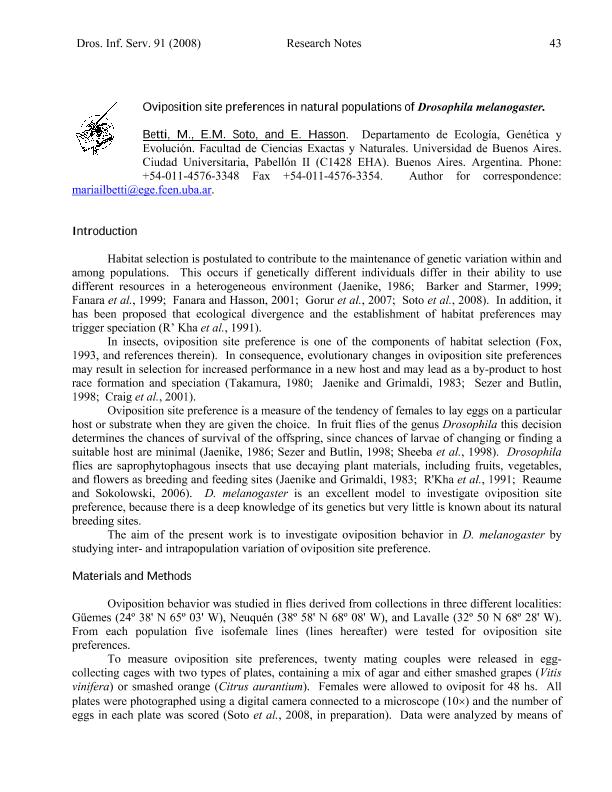Mostrar el registro sencillo del ítem
dc.contributor.author
Betti, María Isabel Luján

dc.contributor.author
Soto, Eduardo Maria

dc.contributor.author
Hasson, Esteban Ruben

dc.date.available
2021-06-18T15:42:51Z
dc.date.issued
2008-12
dc.identifier.citation
Betti, María Isabel Luján; Soto, Eduardo Maria; Hasson, Esteban Ruben; Oviposition site preferences in natural populations of Drosophila melanogaster; University of Oklahoma; Drosophila Information Service; 91; 12-2008; 43-47
dc.identifier.issn
0070-7333
dc.identifier.uri
http://hdl.handle.net/11336/134560
dc.description.abstract
Habitat selection is postulated to contribute to the maintenance of genetic variation within and among populations. This occurs if genetically different individuals differ in their ability to use different resources in a heterogeneous environment (Jaenike, 1986; Barker and Starmer, 1999: Fanara et al., 1999, Fanara and Hasson, 2001; Gorur et al., 2007; Soto et al., 2008). In addition, it has been proposed that ecological divergence and the establishment of habitat preferences may trigger speciation (R? Kha et al., 1991) In insects, oviposition site preference is one of the components of habitat selection (Fox, 1993 and references therein). In consequence, evolutionary changes in oviposition site preferences may result in selection for increased performance in a new host and may lead, as a by-product to host race formation and speciation (Takamura, 1980; Jaenike and Grimaldi, 1983; Sezer and Butlin, 1998; Craig et al., 2001). Oviposition site preference is a measure of the tendency of females to lay eggs on a particular host or substrate when they are given the choice. In fruit flies of the genus Drosophila this decision determines the chances of survival of the offspring since chances of larvae of changing or finding a suitable host are minimal (Jaenike, 1986; Sezer and Butlin, 1998; Sheeba et al., 1998). Drosophila flies are saprophytophagous insects that use decaying plant materials, including fruits, vegetables and flowers as breeding and feeding sites (Jaenike and Grimaldi, 1983; R´Kha et al., 1991; Reaume and Sokolowski, 2006). D. melanogaster is an excellent model to investigate oviposition site preference, because there is a deep knowledge of its genetics but very little is known about its natural breeding sites. The aim of the present work is to investigate oviposition behaviour in D. melanogaster by studying inter and intrapopulation variation of oviposition site preference.
dc.format
application/pdf
dc.language.iso
eng
dc.publisher
University of Oklahoma
dc.rights
info:eu-repo/semantics/openAccess
dc.rights.uri
https://creativecommons.org/licenses/by-nc-sa/2.5/ar/
dc.subject
Oviposition preference
dc.subject
Drosophila melanogaster
dc.subject
NATURAL POPULATIONS
dc.subject.classification
Otras Ciencias Biológicas

dc.subject.classification
Ciencias Biológicas

dc.subject.classification
CIENCIAS NATURALES Y EXACTAS

dc.title
Oviposition site preferences in natural populations of Drosophila melanogaster
dc.type
info:eu-repo/semantics/article
dc.type
info:ar-repo/semantics/artículo
dc.type
info:eu-repo/semantics/publishedVersion
dc.date.updated
2020-07-20T18:16:05Z
dc.journal.volume
91
dc.journal.pagination
43-47
dc.journal.pais
Estados Unidos

dc.journal.ciudad
Oklahoma
dc.description.fil
Fil: Betti, María Isabel Luján. Consejo Nacional de Investigaciones Científicas y Técnicas. Oficina de Coordinación Administrativa Ciudad Universitaria. Instituto de Ecología, Genética y Evolución de Buenos Aires. Universidad de Buenos Aires. Facultad de Ciencias Exactas y Naturales. Instituto de Ecología, Genética y Evolución de Buenos Aires; Argentina
dc.description.fil
Fil: Soto, Eduardo Maria. Universidad de Buenos Aires. Facultad de Ciencias Exactas y Naturales. Departamento de Ecología, Genética y Evolución; Argentina. Consejo Nacional de Investigaciones Científicas y Técnicas; Argentina
dc.description.fil
Fil: Hasson, Esteban Ruben. Consejo Nacional de Investigaciones Científicas y Técnicas. Oficina de Coordinación Administrativa Ciudad Universitaria. Instituto de Ecología, Genética y Evolución de Buenos Aires. Universidad de Buenos Aires. Facultad de Ciencias Exactas y Naturales. Instituto de Ecología, Genética y Evolución de Buenos Aires; Argentina
dc.journal.title
Drosophila Information Service

dc.relation.alternativeid
info:eu-repo/semantics/altIdentifier/url/https://www.ou.edu/journals/dis/DIS91/91%20Contents.html
Archivos asociados
